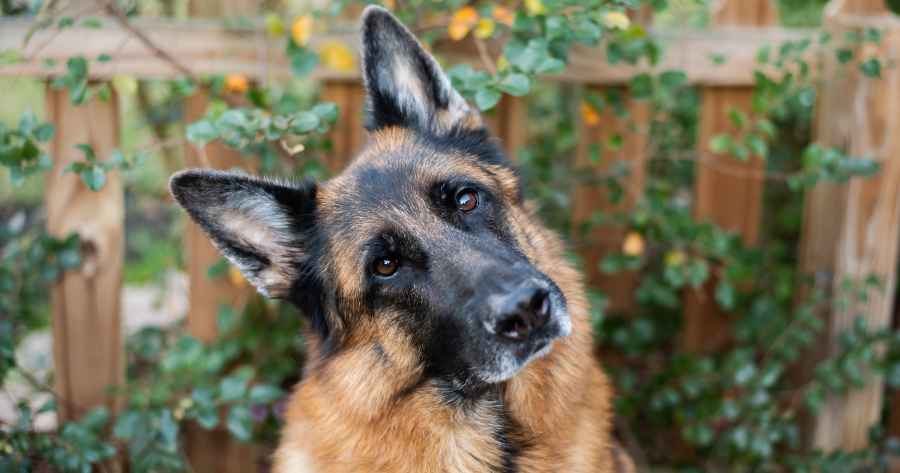Bloat in dogs is not the same as when we feel “bloated” after eating a bit too much. For dogs, bloat is the name of a very serious and dangerous condition. Also known as Gastric dilatation volvulus (GDV), gastric dilation, twisted stomach, or gastric torsion. It occurs when their stomach fills with gas and twists around, trapping the gas and preventing blood flow around the body.
Bloat can happen to any dog at any age, and can be fatal if left untreated. If you suspect your dog is suffering from bloat, take them to the vet immediately, as they may need emergency surgery.
If they’re farting a bit more than usual or need a bit of a lie down after eating, don’t worry.
What causes bloat in dogs?
It’s caused by the stomach filling with gas and twisting around. Although vets still don’t know which happens first – whether it fills with gas and then twists, or it twists first and then fills with gas. There does appear to be a link between bloat and eating and drinking behaviour, such as:
- Exercise too soon after eating or drinking
- Excessive air inhalation when a dog eats
For most, bloat is relatively uncommon, so these causes shouldn’t be too much of a concern to many dog owners. But they can be an issue for:
- Breeds with large, deep chests, such as Great Danes, German shepherds, St Bernards, Standard Poodles, Setters and various Hounds
- Older dogs (middle age upwards)
- Male dogs
- Dogs with conditions where the stomach is already inflamed
What are the symptoms of bloat in dogs?
The obvious physical symptom of bloat in dogs is a swollen upper abdomen – as your dog’s bloated stomach fills with gas it will expand and feel tight like a drum. There are other behavioural symptoms of bloat; your dog will seem anxious, agitated or uncomfortable, they’ll pant and breathe faster, and it may look like they’re trying to be sick but nothing comes up.
These signs of pain and discomfort will get worse as the gas continues to expand and puts pressure on the blood flowing back to the heart. This in turn will likely cause your dog’s lips and gums to turn blue through lack of blood flow. They may also collapse. All this can happen within an hour of the stomach twisting around.
It’s critical to get your dog to a vet as soon as the symptoms start.
There may be times that your dog appears to have some of the symptoms and it’s not actually bloat. For example, your dog may have a swollen stomach but no pain if they’ve eaten too much – labradors are quite prone to this. However, if you’re in doubt, we recommend always getting your dog checked by a vet.
What can I do if I think my dog has bloat?
Bloat is relatively uncommon in most breeds, other than those listed earlier, so many owners probably won’t need to worry about their dog being affected. However, if your dog does have a swollen stomach and you suspect it may be bloat, the vet is the only one who can help because surgery is the only course of action. Bloat can be fatal, but around two-thirds of dogs will survive if surgery is performed fast enough.
What can I do to prevent bloat?
Because of the link between eating behaviour and bloat, it’s important to leave a sensible amount of time between feeding and exercise. 30 minutes should be enough. A slow feeder that stops your dog from wolfing down their food should also help reduce the risk of bloat. There’s still debate over whether a raised feeder helps, or wet or dry food is more likely to cause it.
Some owners and vets opt for a preventative gastropexy (also known as a prophylactic gastropexy) to reduce the risk of bloat. It’s elective surgery that can stop the stomach from twisting. It’s particularly popular in America, and often performed at the same time that the dog is spayed or neutered. If you have a breed more prone to bloating, this may be an option to discuss with your vet.


I am very interested in the Tails.com free Dog Food Trial, but do not have a Debit/Credit Card.
How can I pay the £1 delivery charge, please?
Hi Michael,
You can pay by Paypal as an alternative or contact our Customer Service team to discuss if there are other payment options – hello@tails.com
Thanks
Ellie
Hi I’m just signing up for a free trial for Bruno but need to tell you he’s still active but he has lymphoma in December the vet gave him 4-6 weeks and we are so relieved he is still here, will this change his ingredients at all.
Hi Ann,
Please reach out to our Customer Service team hello@tails.com
They will be able to help answer your questions about Bruno blend
Thanks
Ellie